Mercedes EQA vs Volvo EX30 - Differences and prices compared
Compare performance (292 HP vs 428 HP), boot space and price (44200 £ vs 33000 £ ) at a glance. Find out which car is the better choice for you – Mercedes EQA or Volvo EX30?
Costs and Efficiency:
Price and efficiency are key factors when choosing a car – and this is often where the real differences emerge.
Volvo EX30 has a noticeable advantage in terms of price – it starts at 33000 £ , while the Mercedes EQA costs 44200 £ . That’s a price difference of around 11246 £.
In terms of energy consumption, the advantage goes to the Mercedes EQA: with 14.40 kWh per 100 km, it’s somewhat more efficient than the Volvo EX30 with 17 kWh. That’s a difference of about 2.60 kWh.
As for electric range, the Mercedes EQA performs to a small extent better – achieving up to 561 km, about 85 km more than the Volvo EX30.
Engine and Performance:
Under the bonnet, it becomes clear which model is tuned for sportiness and which one takes the lead when you hit the accelerator.
When it comes to engine power, the Volvo EX30 has a evident edge – offering 428 HP compared to 292 HP. That’s roughly 136 HP more horsepower.
In acceleration from 0 to 100 km/h, the Volvo EX30 is clearly quicker – completing the sprint in 3.60 s, while the Mercedes EQA takes 6 s. That’s about 2.40 s faster.
In terms of top speed, the Volvo EX30 performs somewhat better – reaching 180 km/h, while the Mercedes EQA tops out at 160 km/h. The difference is around 20 km/h.
There’s also a difference in torque: Volvo EX30 pulls barely noticeable stronger with 543 Nm compared to 520 Nm. That’s about 23 Nm difference.
Space and Everyday Use:
Whether family car or daily driver – which one offers more room, flexibility and comfort?
Both vehicles offer seating for 5 people.
In curb weight, Volvo EX30 is a bit lighter – 1840 kg compared to 2045 kg. The difference is around 205 kg.
In terms of boot space, the Mercedes EQA offers hardly perceptible more room – 340 L compared to 318 L. That’s a difference of about 22 L.
In maximum load capacity, the Mercedes EQA performs noticeable better – up to 1320 L, which is about 320 L more than the Volvo EX30.
When it comes to payload, Mercedes EQA barely noticeable takes the win – 425 kg compared to 390 kg. That’s a difference of about 35 kg.
Who comes out on top?
Overall, the Volvo EX30 shows itself to be is largely superior and secures the title of DriveDuel Champion.
It convinces with the more balanced overall package and proves to be the more versatile choice for everyday use.
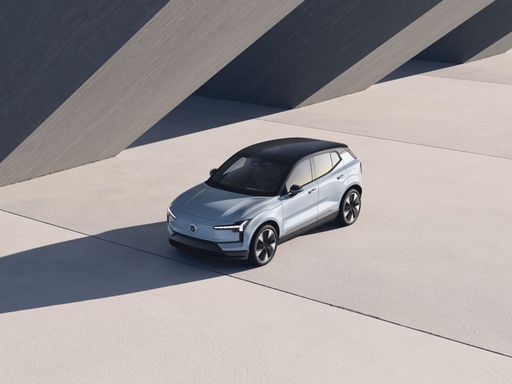
Volvo EX30
Costs and Consumption
View detailed analysis
Engine and Performance
View detailed analysis
Dimensions and Body
View detailed analysis
Mercedes EQA
The Mercedes EQA slips into the electric crossover ranks with the brand’s familiar luxury polish, offering a quiet, fuss-free drive that feels perfectly at home in the city or on a country escape. Inside it’s neatly finished and tech-forward, projecting grown-up refinement even if it plays things a bit safe for anyone chasing outright excitement.
details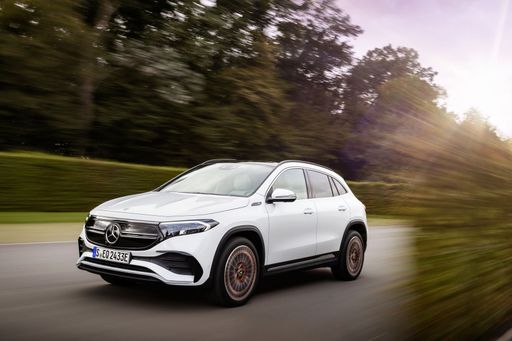
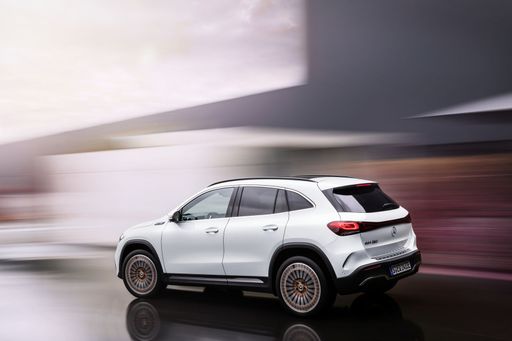
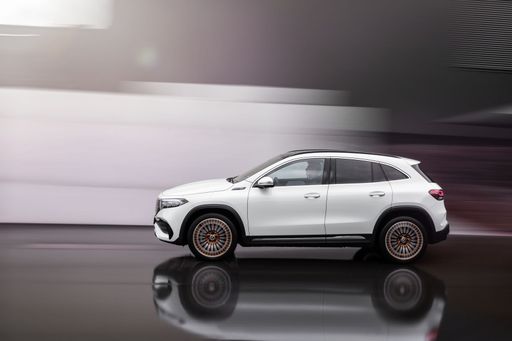
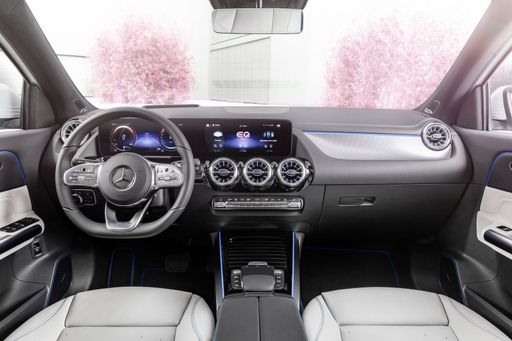
Volvo EX30
The Volvo EX30 arrives as a compact electric with crisp Scandinavian design and a cheeky personality, proving you can be serious about safety and still enjoy a grin on your commute. Its cabin is cleverly packaged and delightfully easy to live with, offering smart tech and practical touches that make it feel like a grown-up's city car with a sense of fun.
details



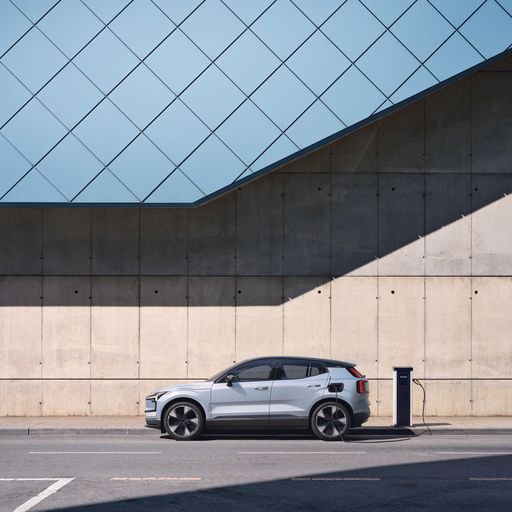
Costs and Consumption |
|
|---|---|
|
Price
44200 - 57400 £
|
Price
33000 - 49100 £
|
|
Consumption L/100km
-
|
Consumption L/100km
-
|
|
Consumption kWh/100km
14.4 - 16.9 kWh
|
Consumption kWh/100km
17 - 18.7 kWh
|
|
Electric Range
476 - 561 km
|
Electric Range
339 - 476 km
|
|
Battery Capacity
70.50 kWh
|
Battery Capacity
49 - 65 kWh
|
|
co2
0 g/km
|
co2
0 g/km
|
|
Fuel tank capacity
-
|
Fuel tank capacity
-
|
Dimensions and Body |
|
|---|---|
|
Body Type
SUV
|
Body Type
SUV
|
|
Seats
5
|
Seats
5
|
|
Doors
5
|
Doors
5
|
|
Curb weight
2045 - 2115 kg
|
Curb weight
1840 - 1960 kg
|
|
Trunk capacity
340 L
|
Trunk capacity
318 L
|
|
Length
4463 mm
|
Length
4233 mm
|
|
Width
1834 mm
|
Width
1838 mm
|
|
Height
1608 - 1613 mm
|
Height
1550 - 1567 mm
|
|
Max trunk capacity
1320 L
|
Max trunk capacity
1000 L
|
|
Payload
425 kg
|
Payload
370 - 390 kg
|
Engine and Performance |
|
|---|---|
|
Engine Type
Electric
|
Engine Type
Electric
|
|
Transmission
Automatic
|
Transmission
Automatic
|
|
Transmission Detail
Reduction Gearbox
|
Transmission Detail
Reduction Gearbox
|
|
Drive Type
Front-Wheel Drive, All-Wheel Drive
|
Drive Type
Rear-Wheel Drive, All-Wheel Drive
|
|
Power HP
190 - 292 HP
|
Power HP
272 - 428 HP
|
|
Acceleration 0-100km/h
6 - 8.6 s
|
Acceleration 0-100km/h
3.6 - 5.7 s
|
|
Max Speed
160 km/h
|
Max Speed
180 km/h
|
|
Torque
385 - 520 Nm
|
Torque
343 - 543 Nm
|
|
Number of Cylinders
-
|
Number of Cylinders
-
|
|
Power kW
140 - 215 kW
|
Power kW
200 - 315 kW
|
|
Engine capacity
-
|
Engine capacity
-
|
General |
|
|---|---|
|
Model Year
2024 - 2025
|
Model Year
2024 - 2025
|
|
CO2 Efficiency Class
A
|
CO2 Efficiency Class
A
|
|
Brand
Mercedes-Benz
|
Brand
Volvo
|
Is the Mercedes EQA offered with different drivetrains?
Available configurations include Front-Wheel Drive or All-Wheel Drive.




